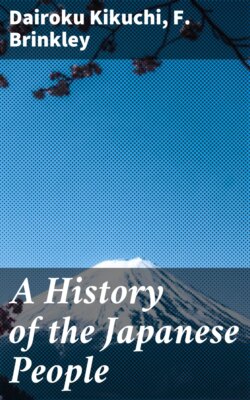Читать книгу A History of the Japanese People - Kikuchi Dairoku - Страница 141
На сайте Литреса книга снята с продажи.
ANKO
ОглавлениеThe records of this sovereign's reign make a discreditable page of Japanese history. Anko, having ascended the throne after an armed contest with his elder brother, which ended in the latter's suicide, desired to arrange a marriage between his younger brother, Ohatsuse, and a sister of his uncle, Okusaka. He despatched Ne no Omi, a trusted envoy, to confer with the latter, who gladly consented, and, in token of approval, handed to Ne no Omi a richly jewelled coronet for conveyance to the Emperor. But Ne no Omi, covetous of the gems, secreted the coronet, and told the Emperor that Okusaka had rejected the proposal with scorn. Anko took no steps to investigate the truth of this statement. It has been already seen that such investigations were not customary in those days. Soldiers were at once sent to slaughter Okusaka; his wife, Nakashi, was taken to be the Emperor's consort, and his sister, Hatahi, was married to Prince Ohatsuse.
Now, at the time of his death, Okusaka had a son, Mayuwa, seven years old. One day, the Emperor, having drunk heavily, confessed to the Empress, Nakashi, that he entertained some apprehension lest this boy might one day seek to avenge his father's execution. The child overheard this remark, and creeping to the side of his step-father, who lay asleep with his head in Nakashi's lap, killed him with his own sword. Such is the tale narrated in the Chronicles and the Records. But its incredible features are salient. A deed of the kind would never have been conceived or committed by a child, and the Empress must have been a conniving party.
To what quarter, then, is the instigation to be traced? An answer seems to be furnished by the conduct of Prince Ohatsuse. Between this prince and the throne five lives intervened; those of the Emperor Anko, of the latter's two brothers, Yatsuri no Shiro and Sakai no Kuro, both older than Ohatsuse, and of two sons of the late Emperor Richu, Ichinobe no Oshiwa and Mima. Every one of these was removed from the scene in the space of a few days. Immediately after Anko's assassination, Ohatsuse, simulating suspicion of his two elder brothers, killed the o-omi, who refused to give them up. Ohatsuse then turned his attention to his grand-uncles, the two sons of Richu. He sent a military force to destroy one of them without any pretence of cause; the other he invited to a hunting expedition and treacherously shot. If Ohatsuse did not contrive the murder of Anko, as he contrived the deaths of all others standing between himself and the throne, a great injustice has been done to his memory.
